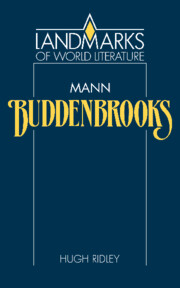Book contents
- Frontmatter
- Contents
- Acknowledgements
- Chronology
- Chronology of Buddenbrooks
- 1 Life and works
- 2 Retrospect on the nineteenth century
- 3 The evolution of the novel
- 4 The theme of decline
- 5 Stages in decline
- 6 Thomas Buddenbrook
- 7 Narrative technique
- 8 The Buddenbrooks' decline: a typical story?
- 9 Literary background and reading public
- 10 Buddenbrooks and the ‘crisis of the novel’
- Suggestions for further reading
10 - Buddenbrooks and the ‘crisis of the novel’
Published online by Cambridge University Press: 15 December 2009
- Frontmatter
- Contents
- Acknowledgements
- Chronology
- Chronology of Buddenbrooks
- 1 Life and works
- 2 Retrospect on the nineteenth century
- 3 The evolution of the novel
- 4 The theme of decline
- 5 Stages in decline
- 6 Thomas Buddenbrook
- 7 Narrative technique
- 8 The Buddenbrooks' decline: a typical story?
- 9 Literary background and reading public
- 10 Buddenbrooks and the ‘crisis of the novel’
- Suggestions for further reading
Summary
Hanno: ‘I thought there was nothing more to come’
(8, 7)We quoted earlier Mann's claim to have written a ‘naturalist’ novel. His use of this term was coloured by the circumstances of German literary history and by Samuel Lublinski's particular choice of words, and – while in European literary discussions the word ‘realist’ would have been more usual – we have seen that Mann's claim for his novel was amply justified. In its narrative technique, its analytical approach to social reality, its reliance on observation and documentation and its pragmatic commitment to reality Buddenbrooks meets the expectations of the realist movement in European fiction and brings them to artistic fruition.
Within the context of German literature Buddenbrooks occupies the place of a landmark, and its achievement is to have brought the German novel into line with the great tradition of European fiction. One novel cannot create an intellectual revolution on its own, but it can demonstrate the possibilities of the moment, and the work of Thomas Mann (and to an important extent that of his brother Heinrich also) brought new standards into German fiction. The break with provincialism was achieved while – as Eberhard Lämmert has shown – bringing together European styles and traditional German forms, notably the novel of education (‘Bildungsroman’), integrating the new and progressive with positive elements of the national tradition. The notorious lack of continuity of German cultural life in this century, broken repeatedly by wars and revolutions, by Hitler's Reich and by division, has made this achievement less fruitful than it might have been, but even such discontinuity cannot diminish its stature.
- Type
- Chapter
- Information
- Mann: Buddenbrooks , pp. 104 - 112Publisher: Cambridge University PressPrint publication year: 1987

